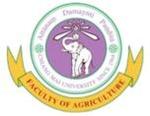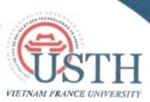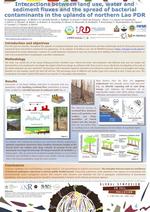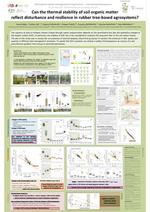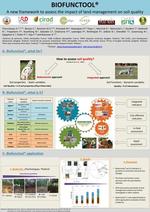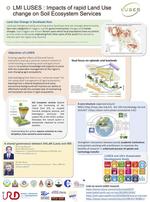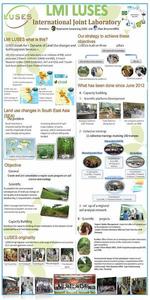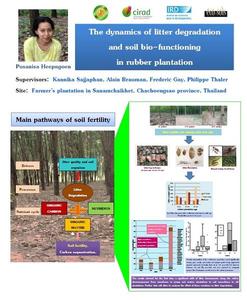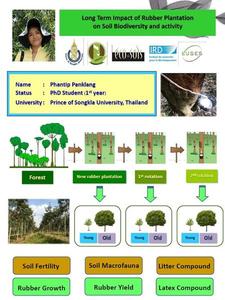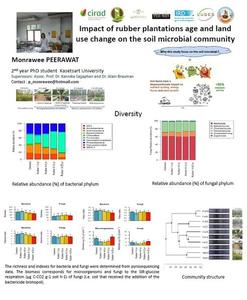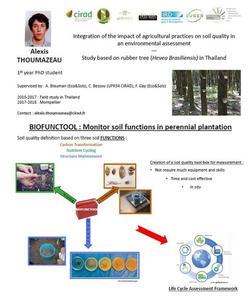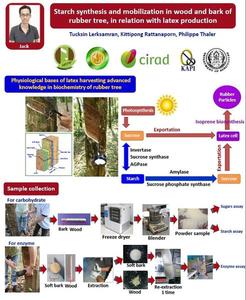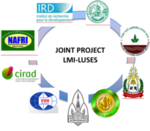The LUSES consortium
Project consortium:
The International project in partnership LMI 'LUSES associate partners in France and Southeast Asia from various universities and technical institutes. The LMI is an operational structure for research and training, allowing the realization of joint training and research around a common scientific platform (laboratories, equipment, IT resources etc.)
Southeast Asian Partner Institutions
LAOS
Department of Agricultural Land Management (DALaM)
The DEPARTMENT OF AGRICULTURAL LAND MANAGEMENT (DALaM), was established in 2012 and is mandated by the Ministry of Agriculture and Forestry of Laos to undertake land inventory, Land use planning, land management and rehabilitation for sustainable uses. DALaM currently comprises 2 research centres (Land Inventory and Land Use Planning Centre and Agro-Ecological Centre) and three research divisions (Land Management Division, Planning and Cooperation Division and Administration Division) based at the DALaM Headquarters. DALaM research programs focus on improving land use and land management and feeding back the impacts of rapid agrarian change to policy makers at different levels. There are 3 research areas as follows:
- Project on Land Use Planning at district level
- Project on Land Management and rehabilitation
- Project on Sustainable management, utilization and conservation of natural resources
The Faculty of Agriculture of the National University of Laos (NUoL)
The faculty of Agriculture of the National University of Laos, hereinafter referred to as NUoL, a public institution duly organized under the laws of the Lao PDR, having its registered office located at Nabong Campus, Vientiane, Lao PDR. National University of Laos (NUOL) is the leading university in Vientiane, the capital of Laos. Founded in 1996, with departments brought in from other existing colleges, it is the only national university in the country. NUOL accepts top students from Laos with few international students. National University of Laos is cooperating with various international universities.
THAILAND
The Department of Plant and Soil Sciences, Faculty of Agriculture, Chiang Mai University (CMU)
The faculty of Agriculture, CMU is a leading national educational scientific agricultural research institute that works at international standards, and produces highly-qualified graduates equipped with excellent management skills and self-reliance.
Our Missions:
1. Education: To provide curricula with an emphasis on academic excellence, curricular that serves market needs, with highly competent graduates produced under an international leadership environment.
2. Research: To conduct research and development activities regarding new knowledge areas, in response to the educational environment and in order to further economic, social and national development.
3. Academic services: To provide academic services to society through the transfer and extension of research activities and findings to farmers, communities and society, for their further applications.
4. Arts and culture conservation: To conserve the arts, culture and environment, especially "Lanna" arts and cultures, as well as traditions and agriculture-related local wisdom in the northern region.
5. Management: To develop management and administration activities in all respects under the autonomous university system, with good governance and efficiency.
Faculty of Agriculture, CMU comprises of 4 departments and 3 research centers.
Departments
1. Entomology and Plant Pathology
2. Plant Science and Natural Resources
3. Agricultural Economics and Agricultural Extension
4. Animal and Aquatic Sciences
Research centers
1. Mae Hia Agricultural Research, Demonstrative, and Training Center
2. Highland Research and Training Center
3. Center for Agricultural System Research
The Land Development Department (LDD)
Created in 1963, the Land Development Department (LDD) is an organization under the perview of the Thai Ministry of National Development. LDD is responsible for soil survey and classification, soil analysis, land use planning,conduct experiments and carry various aspects of land development, assist farmers in soil and water conservation practices and soil improvement.
Kasetsart University (KU)
Kasetsart University represents more than 35.000 students. The establishment of Kasetsart University in 1943 was part of the evolution of agricultural education in the country which began with the founding of a system of technical schools at the beginning of the 20th century. It includes among other faculties of agriculture, fishery, forestry and veterinary medicine.
The Faculty of Agriculture, KhonKaen University (KKU)
First University of Isan (Northeast Thailand), Khon Kaen university was established in 1964 under the National Development Plan for higher education in regions. Located on a campus of 900 hectares, it is composed of 16 faculties and numerous affiliated institutes. This university constitutes a scientific, cultural and economic center for the poorest region of Thailand.
VIETNAM
The Soils and Fertilizer s Research Institute (SFRI)
The Soils and Fertilizers Research Institute (Vietnam Academy of Agricultural Sciences), hereinafter referred to as SFRI, a public scientific establishment, created on 6th March 1969. Public scientific institution under the leadership of the Vietnam Academy of Agricultural Science.The function of "Soils and Fertilizers Research Institute" (formerly National Institute of Soils and Fertilisers - NISF) is to study and transmit technologies on soil and fertilizer and agricultural environment in Vietnam.
The Institute of Chemistry
The Institute of Chemistry under the Vietnam Academy of Science and Technology (VAST) was founded by Decision No. 230/CP dated September 16, 1978 of the Government of Vietnam.
ICH is responsible for carry out various problems in different areas of chemistry such as Organic Chemistry, Natural Product Chemistry, Heavy Metals Chemistry and Polymer Chemistry and also to conduct the postgraduate training. It includes the collaboration relating to research, development and training activities with higher educational institutions and with other research and industrial establishments, both in Vietnam and abroad.
The University of Science and Technology of Hanoi
University of Science and Technology of Hanoi (USTH), also – called “Vietnam-France University”, is an unique International Standard Public University in Hanoi established in 2009 under the Intergovernmental Agreement between Vietnam and France signed on November, 12th 2009, following the decision number 2067/QĐ-TTg on December, 9th 2009 made by the Prime Minister.
As a public university modeled according to international standards, USTH is being built with funds from the Government of Viet Nam and a strong support from the French Government, Vietnam Academy of Science and Technology (VAST), Asian Development Bank and the Consortium of 42 universities and researching organizations of France.
On March 18th 2016, USTH was transferred to the VAST, following the decision made by the Prime Minister. This decision was taken to help scientists and other institutes of VAST to actively contribute to the training of USTH students and the development of research.
USTH always focuses on promoting the high quality of training courses in parallel with research activities and strong connections with the leading companies in science and technology in Vietnam.
French Partners
Institut de Recherche pour le Développement (IRD)
The French National Research Institute for Sustainable Development (IRD), an internationally recognised multidisciplinary organisation working primarily in partnership with Mediterranean and inter-tropical countries, is a French public establishment under the joint authority of the French Ministry of Higher Education and Research and the Ministry of Foreign Aairs and International Development.
Via its network and presence in fifty or so countries, it takes an original approach to research, expertise, training and knowledge-sharing, to the benefit of countries and regions that make science and innovation key drivers in their development.
- A rich community of over 7,000 people including 2019 IRD agents (820 IRD researchers and 1,228 IRD engineers and technicians)
- 35% of agents working outside mainland France
- 65 joint research units under IRD co-supervision
- Almost 1300 publications in the Web of science
The pillars of IRD's action for development are:
- An equitable scientific partnershipand co-publications with partnersin developing countries
- Solutions which are adapted to globalchallenges and based on scientific evidence
- Public policies informed by scientific advances
- Citizens driving changeResponsible innovations
- Specific expertise and know-how
http://www.ird.fr/
UMR iEES-PARIS
The Institute of Ecology and Environmental Sciences of Paris gathers 153 scientists and administrative staff spread across 14 research teams and 4 scientific departments. The overall objectives of iEES Paris are to 1) Analyse and model the structure, functioning and evolution of ecological systems for predictive ecology /environmental sciences; 2) Contribute to innovation in sustainable management of biodiversity, ecosystems and biological resources and to develop adaptation strategies to global change; 3) Educate on recent advances in ecology, environmental sciences and ecological engineering. iEES Paris has wide expertise in virtually all areas of ecology and is one of the leading French labs in soil and water sciences, with recognized expertise in biogeochemical cycles, physics and soil biology and watersheds dynamics. iEES Paris uses a variety of methods : mathematics, statistics, long-term observations, field experiments, experiments in controlled conditions, isotopic chemistry, molecular biology.
http://ieesparis.ufr918.upmc.fr/
UMR ECO&SOL
Eco&Sols is a French research consortium gathering scientists from different French institutes (INRA, IRD, and CIRAD) and the International Centre for Higher Education in Agricultural Sciences of Montpellier, SupAgro. Eco&Sols is located in France at the University campus of Montpellier Supagro and has six main foreign sites including Thailand and is represented by its director Dr Jean-Luc Chotte.
http://www5.montpellier.inra.fr/ecosols
UMR GET
Geosciences Environment Toulouse is a large laboratory from CNRS, University of Toulouse and IRD with more than 250 staff. A large group of scientists from this laboratory is actively involved in field studies of soil, waters and plants, together with others specialist of experimental methods aiming at reproducing field observations and numerical modellers. This laboratory is also at the forefront in the exploration of new geochemical tracers, like Fe and Zn isotopes, thanks to state of the art analytical equipment (high resolution MC- ICP-MS, collision cell ICP-MS, ultrafast laser ablation systems).
CIRAD
CIRAD (Centre de coopération internationale en recherche agronomique pour le développement) is a public industrial and commercial enterprise (EPIC) under the joint authority of the Ministry of Higher Education and Research and the Ministry of Foreign and European Affairs.
CIRAD works with the whole range of developing countries to generate and pass on new knowledge, support agricultural development and fuel the debate on the main global issues concerning agriculture. CIRAD is a targeted research organization, and bases its operations on development needs, from field to laboratory and from a local to a global scale.
CIRAD's activities involve the life sciences, social sciences and engineering sciences, applied to agriculture, food and rural territories.
CIRAD works hand-in-hand with local people and the local environment, on complex, ever-changing issues: food security, ecological intensification, emerging diseases, the future of agriculture in developing countries, etc.
LMI LUSES Posters
Presentation of the ECOFILTER Team at the Global Symposium on Soil Pollution (GSOP18), FAO, Rome, 2-4 May 2018
Poster of the BIODIV TREE team presented at the SOM management conference held in Braunsweig on the 30 and 31 of May
Poster of the BIODIV TREE team presented at the SOM management conference held in Braunsweig on the 30 and 31 of May
Synopsis of LUSES 2017-2019
- LDD-IRD a long history of scientific cooperation
- Impact of Rubber Tree Plantation on Soil Biological Diversity
- LDD-LMI LUSES Platform of Microbiology
- LMI LUSES presentation
- PCR LDD-LMI LUSES Platform
- Laboratory guide: hygiene and safety in English
- Laboratory guide: hygiene and safety in Thai
PhDs students' scientific posters
The dynamics of litter degradation and Soil-bio functioning in Rubber plantation : Pusanisa Heepngoen
Long term impact of Rubber Plantation on Soil biodiversity and Activity: Phantip Panklang
Impact of Rubber Plantation age and Land use change on the soil microbial community : Monrawee
Integration of the impact of agricultural practices on soil quality in an environmental assessment : Alexis
Starch Synthesis and Mobilization in wood and bark of rubber tree, in relation with Latex production : Tuksin







